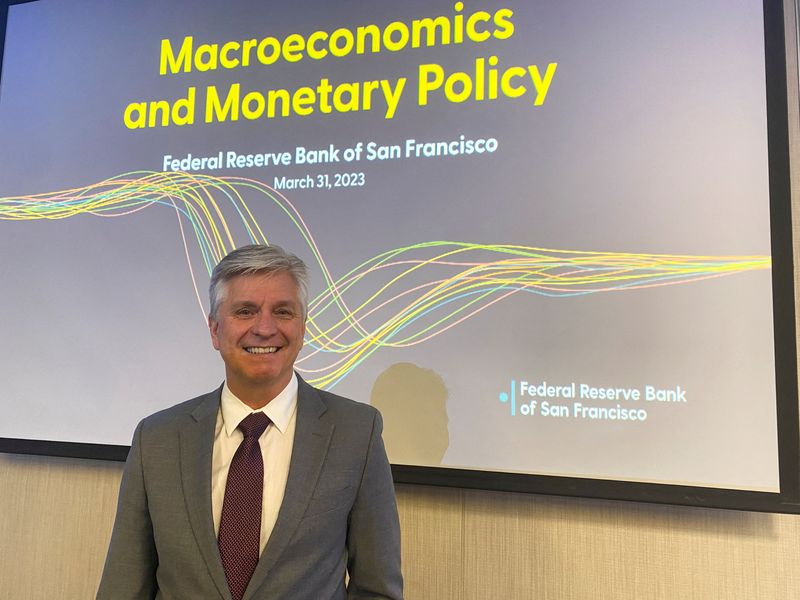Fed’s Waller calls Q3 US GDP growth a ‘blowout’ number that warrants watching
2023.11.07 12:51

© Reuters. FILE PHOTO: Federal Reserve Governor Christopher Waller poses before a speech at the San Francisco Fed, in San Francisco, California, U.S., March 31, 2023. REUTERS/Ann Saphir/File Photo
By Howard Schneider and Lindsay (NYSE:) Dunsmuir
WASHINGTON (Reuters) – Third-quarter U.S. economic growth, at an annualized 4.9% rate, was a “blowout” performance that warrants watching as the Federal Reserve considers its next policy moves, Fed Governor Christopher Waller said on Tuesday.
“This was an outstanding quarter … this big blowout number,” Waller told an economic data seminar at the St. Louis Fed. In looking at the components of U.S. output, “everything was booming. So this is something we are keeping a very close eye on when we think about policy going forward.”
U.S. central bank officials including Fed Chair Jerome Powell have said they feel the U.S. needs a period of subdued economic growth for inflation to cool from the current level of around 3.4%, based on the Fed’s preferred measure, to the central bank’s 2% target.
Many economists and investors feel that an economic slowdown is likely underway, and largely expect the Fed to hold interest rates steady at the Dec. 12-13 policy meeting.
Waller, who has been among the most ardent advocates of aggressive Fed rate hikes to battle high inflation, did not include a policy recommendation in his remarks.
But he noted that after a run of “amazing” job growth, “the labor market is cooling a bit … It’s clearly calming down,” with recent job growth more in line with the levels seen before the coronavirus pandemic, a development Fed policymakers also feel is necessary for inflation to return to the 2% target.
The Fed is in the process of weighing that and other data to determine if it will be necessary to raise its benchmark overnight interest rate beyond the current 5.25%-5.50% range that was set in July.
Against the economic growth seen in recent months, a rise in long-term bond yields has led some Fed officials to feel that credit conditions may be tightening enough that the central bank will not need to raise its own short-term policy rate anymore.
In separate comments to CNBC on Tuesday, Chicago Fed President Austan Goolsbee noted that inflation has been slowing, and that the rise in market-based interest rates, “if … sustained at high levels” most likely represents a tightening of credit conditions.
“Then we have got to take that into account … We should expect to see that with a lag working its way through the economy. So we’re all paying attention and trying to figure out what the driver is,” Goolsbee said.
The Fed’s current cautious approach to any further rate increases has been bolstered by the rise in bond yields and higher market interest rates.
But neither Goolsbee nor Minneapolis Fed President Neel Kashkari, who spoke to Bloomberg Television on Tuesday, ruled out further Fed rate increases.
Noting, as Waller did, the recent “hot” readings on economic activity, Kashkari said “that makes me question if policy is as tight as we assume it currently is.”
“If you saw inflation tick back up and you saw continued very strong economic activity in the real side of the economy, that would tell me we might need to do more,” Kashkari added.








